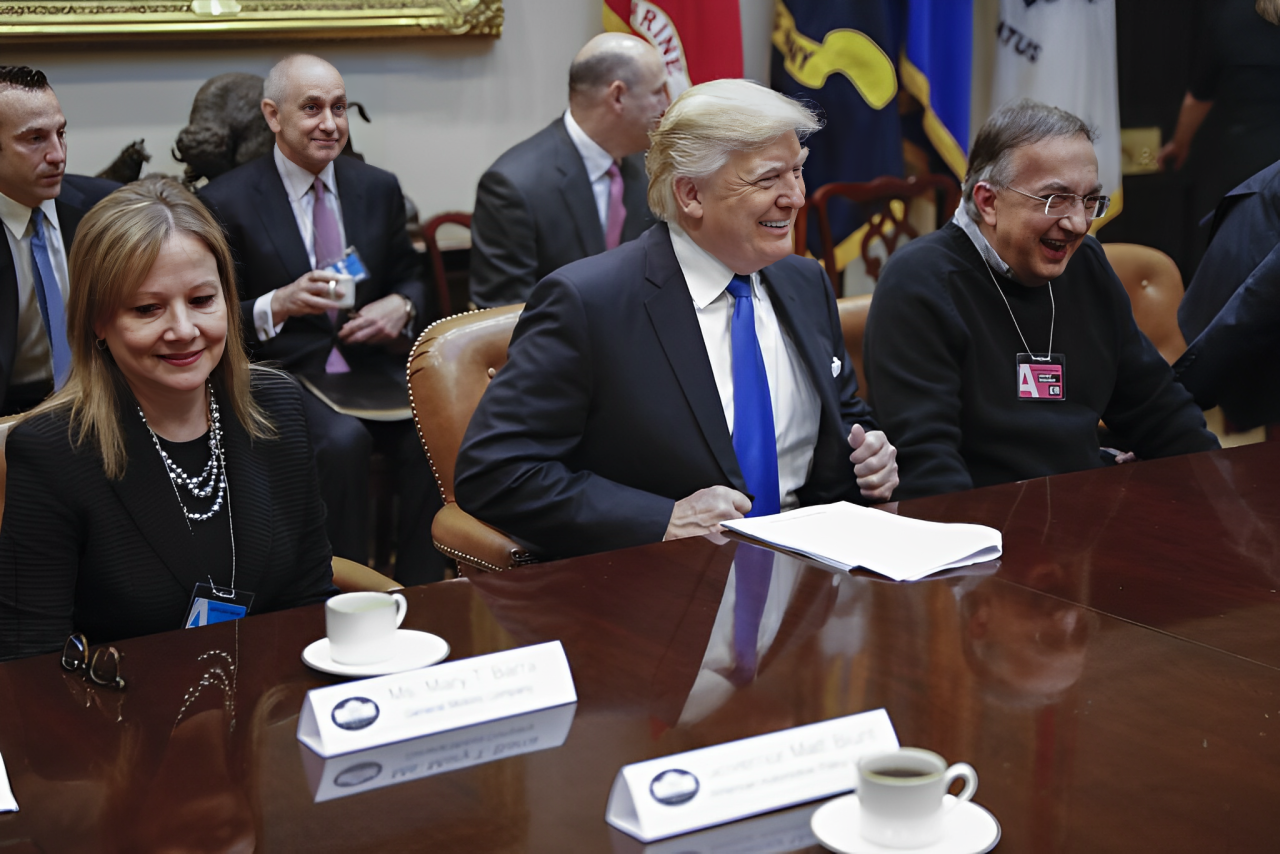Ford Motor Co. and General Motors Co. made significant contributions to Donald Trump’s inauguration, each donating $1 million and providing fleets of vehicles. However, these efforts didn’t seem to guarantee Michigan’s automakers a seat at the table, especially when it came to the new president’s economic decisions.
Despite his promises to rejuvenate U.S. manufacturing, Trump’s focus has shifted toward the booming tech industry, with tech billionaires stepping into the spotlight. During the inauguration, prominent CEOs from companies like Amazon, Meta, and Google were seen sitting in key positions, leaving major automotive leaders out of the prime spots.
Elon Musk, the CEO of Tesla, SpaceX, and other ventures, was particularly influential in Trump’s circle. Musk spent over $250 million to back Trump’s re-election campaign, positioning himself as one of the most powerful figures in the new administration. His influence could impact decisions that may be detrimental to Michigan’s auto industry.
Soon after taking office, Trump introduced policies that could hurt Michigan’s economy, particularly in the automotive sector. One of the most concerning moves was his plan to impose hefty tariffs: a 25% tariff on goods from Canada and Mexico, along with a potential 10% tariff on imports from China. His announcement to roll back energy policies, particularly those designed to push for electric vehicle (EV) development, further worried Detroit’s automakers.
In contrast, the president’s inauguration was accompanied by the announcement of “Stargate,” a new artificial intelligence (AI) infrastructure project backed by major tech firms such as SoftBank, Oracle, and OpenAI. This project, which could cost up to $500 billion and create 100,000 jobs, highlights the growing clout of the tech industry in Washington. Trump also reversed an executive order from President Biden that aimed to create safety standards for AI, showing the tech industry’s increasing influence over U.S. policy.
These shifts in policy and priorities have left Michigan’s auto industry grappling with an uncertain future. While the tariff policies weren’t unexpected, they add pressure to an already challenging environment for automakers. The auto industry, already facing high vehicle costs, investments in new technologies, and fierce global competition, may now have to deal with unpredictable trade rules and policies.
The situation is even more challenging because Trump is now more familiar with Washington’s political landscape. His administration, supported by a Republican-controlled House and Senate, may find it easier to push through policies that don’t necessarily align with the interests of Michigan’s auto industry.

In response to the uncertainty created by Trump’s policies, MichAuto, an industry group supporting Michigan’s automotive sector, warned that the new tariffs could weaken U.S. competitiveness. The group raised concerns about potential disruptions in the supply chain and the effect tariffs could have on investments, particularly as the new Gordie Howe Bridge connecting Detroit and Windsor is set to open later this year.
While tariffs could offer short-term protection for Michigan automakers against foreign competition, the long-term effects could be harmful. Retaliatory tariffs from other countries could increase the cost of goods, and Trump’s promise to lower prices might be at odds with the economic consequences of these tariffs. University of Michigan economist Gabe Ehrlich pointed out that tariffs are unlikely to provide lasting benefits for the auto industry without causing higher prices elsewhere.
While many hope that these policies won’t materialize immediately, it’s uncertain when or if Trump will follow through on his threats. As Glenn Stevens of MichAuto noted, “There’s a lot of rhetoric right now, and we hope calmer heads will prevail.”
Another major concern for automakers is Trump’s approach to energy policy. Analysts agree that the Detroit Three automakers will continue investing in electric vehicles because the global market is shifting towards EVs. However, Trump’s stance, which includes measures to protect gas-powered vehicles and roll back support for electric vehicle technologies, may threaten the business case for electric cars and trucks in the U.S. market.
Trump’s executive order aims to reverse Biden’s goal of having half of all cars and trucks in the U.S. be electric or hybrid by 2030. The order also halts all spending related to EV incentives and calls for a fossil fuel-based energy policy instead. Trump’s declaration, “We will drill, baby, drill,” signals his commitment to fossil fuels, which could undermine efforts to accelerate the adoption of cleaner, more sustainable technologies.
There is still a glimmer of hope for the auto industry. Ford’s executive chairman, Bill Ford Jr., shared that Trump had personally called him to discuss the auto sector. Ford came away from the conversation hopeful that the industry would have “a seat at the table” as the administration shapes future economic policies. This sentiment is crucial for Michigan’s automakers, as having a voice in policy decisions is key to navigating the challenges ahead.
As Glenn Stevens wisely put it, “When you’re not at the table, you’re on the menu.” Michigan’s automakers are fighting to ensure that they remain an integral part of the national economic conversation, but with tech billionaires gaining influence, it’s unclear how many seats remain for them at the table.
Disclaimer: This article has been meticulously fact-checked by our team to ensure accuracy and uphold transparency. We strive to deliver trustworthy and dependable content to our readers.

